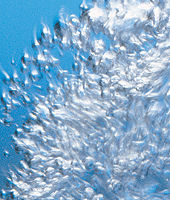Advertisement
Water Purifiers
Water sustains life. The water you drink replenishes your body’s cells and flushes out waste to keep you healthy and vibrant. In fact, at any given time, almost two-thirds of your body is composed of the water you’ve consumed in the previous few days. Now picture this: a friend offers you a glass of water … Continued
 Water sustains life. The water you drink replenishes your body’s cells and flushes out waste to keep you healthy and vibrant. In fact, at any given time, almost two-thirds of your body is composed of the water you’ve consumed in the previous few days.
Water sustains life. The water you drink replenishes your body’s cells and flushes out waste to keep you healthy and vibrant. In fact, at any given time, almost two-thirds of your body is composed of the water you’ve consumed in the previous few days.
Now picture this: a friend offers you a glass of water and presents you with something that smells strongly of chlorine. When you pull a face, she laughs and says she knows it smells, but thinks it’s okay to drink.
In a way, she’s right; chlorine is the very reason that most municipally treated water is “okay.” Ever since the disinfecting properties of chlorine were discovered in the 19th century, cities have been adding it to drinking water to kill harmful micro-organisms and pathogens.
But the benefits of chlorination come at a cost. Although scientists and health officials generally agree that chlorine levels in municipally treated water are too low to pose a significant health risk to humans, the use of chlorine actually creates byproducts that can cause serious harm.
When chlorine reacts with organic material, such as leaves and twigs in source water, it produces chlorinated organic compounds called trihalomethanes, which include such toxic substances as chloroform. Several studies have shown these substances to be carcinogenic even in extremely low doses, and other studies have implicated them in problems during pregnancy.
Chlorine and its byproducts aren’t the only hazards. Lead from pipes can leach into water supplies. If your drinking water comes from an untreated source such as a private well, the groundwater supply can become tainted with diseases such as Giardia or Cryptosporidium, fecal coliform from animal waste, or chemicals such as pesticides.
Filter it First
If you’re concerned about what may be in your water, have your water tested for contaminants and then look for a water filtration system that can effectively remove those contaminants.
For people on a municipal water supply, an effective and affordable way to treat drinking water is with a faucet or pitcher filter that uses activated charcoal. Faucet filters easily attach to a standard faucet, and a single filter will treat approximately 100 gallons of water. The popular pitcher-style filters are available for anywhere from $20 to $60.
These filters can be very effective in reducing chlorinated byproducts and lead the usual culprits in water drawn from a treated municipal water supply. However, if your water is untreated and comes from a private source such as a well, you may want to consider a more comprehensive filtering solution for added protection against bacteria and other contaminants.
More robust filtering systems include reverse osmosis units, which force water through a membrane that removes most micro-organisms and contaminants; ultraviolet (UV) systems, which use UV light to kill pathogens; and whole-house systems, which often use a combination of filters to treat all household water.
Choosing the Right Filter
The first step in choosing the filtration system that is right for you is to have your water tested. You can have this done professionally or, if you prefer, you can buy a relatively inexpensive home kit and do it yourself.
Once you have determined what contaminants are in your water, visit your local health food store to determine the system that is right for you. Before you begin shopping, estimate how much drinking water your family requires daily, then double that figure so that you will have an adequate supply on hot days or when entertaining visitors.
With the right water filter, you’ll enjoy the peace of mind that comes from knowing that your family’s water supply is pure, healthy, and free of contaminants – and that’s refreshing. While you’re at it, you might consider picking up a pitcher filter as a gift for that friend with the smelly tap water.




